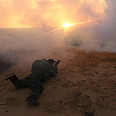
Ready for the next war?
צילום: רועי עידן
Is IDF a hollow army?
Op-ed: Will Israel’s undertrained, ill prepared military be ready to face foes in day after Iran strike?
This year will mark the First Lebanon War’s 30th anniversary and the Second Lebanon War’s sixth anniversary. Nobody is wise enough to predict when the Third Lebanon War shall break out. Yet one need not be wise to guess, predict or expect such war to take place one of these days.
What we should know, must know and better remember is that nothing has changed in the past three decades. The sea is the same is, as that’s up to the forces of nature. The Arabs are the same Arabs, and that’s not up to us either; it’s what the region produces. The cause for concern, and this is certainly up to us, is that the IDF is the same IDF – hollow, undertrained and ill prepared.
This week, Yedioth Ahronoth published a letter by regiment commanders. The first part settled the score with the government and Knesset for breaking all the promises made to IDF reservists. The government made loud declarations, pledged and finalized benefits and concessions – yet none of them was implemented. This was the embarrassing part of the letter.
Yet the concerning part refers to the organization as a whole. The regiment commanders reported a shortage in training days; they don’t know their own soldiers, and their soldiers are unfamiliar with the weapons in their possession.
A while ago, IDF Major General (res.) Prof. Yishai Bar was interviewed by Haaretz and likened the ground forces to a bad check. He spoke of an ill trained and unskilled military that is unfit to perform its missions. Most of his criticism and pain was dedicated to the ground corps - the reserve divisions and armored corps.
On the eve of the Second Lebanon War, then-Prime Minister Ehud Olmert and then-Defense Minister Amir Peretz were hosted by the IDF General Staff. During a lengthy, solemn discussion, then-Major General Yitzhak Harel coined the term “hollow army.” The discussion was expanded and then stretched, as always, like an instinct, like a reflex, to the defense budget.
Folds of fat, little muscle
Once upon a time, we had the Brodet Commission examine the defense budget. The commission discovered some interesting points. The bottom line was the most important. The Brodet Commission spoken not only about the IDF, but also about the Defense Ministry; not only about the size of the budget, but also about the way it’s being utilized and prioritized.
The commission asserted that manpower and office staff should be minimized, that dualities within the IDF and Defense Ministry be eliminated, that certain frameworks be amalgamated, that the Rehabilitation Branch and Construction Branch be thoroughly cut down, and that the hordes of secretaries at the various headquarters and branches be reduced. In short, the commission called for a true administrative revolution.
The Brodet Commission saw from its offices the backdrop and reasons for the images that the soldiers and regiment commanders see in the field: A huge defense budget that is used to maintain a bureaucracy rather than a fighting force, thereby producing folds of fat rather than muscle mass.
Until the Six-Day War, our defense discourse made a distinction between readiness (regular defense operations) and preparation (for war.) Yet as our hold in the territories deepened and the settlement enterprise expanded, preparation was increasingly swollen up by readiness. The IDF is no longer just a defense force; it is also forced to be an occupation and policing army at the same time. Major-General Yishai Bar, a religious yeshiva graduate, believes that utilizing the IDF in the territories is making the army more atrophied and uglier.
Into this complex whole comes the debate on an Iran strike. Both sides, strike supporters and objectors, speak up loudly, directly and through spokespeople. Almost everything is clear in the apocalyptic arguments of strike fans, with the exception of one thing: The contempt they hold for “minor matters.” Following an Iran strike, Hezbollah, Hamas and other terror groups may strike Israel. Who will hit back hard? Who will confront them?
A few years ago, the Israel Police decided to deploy cardboard cruisers on the side of roads nationwide. The bogus cruisers looked wonderful. They were shiny and could be seen from afar. In retrospect, they were found to be purposeless and meaningless. Given the shortage in training and the ill preparations, the IDF’s tanks and combat vehicles are not much different than those cardboard cruisers.










